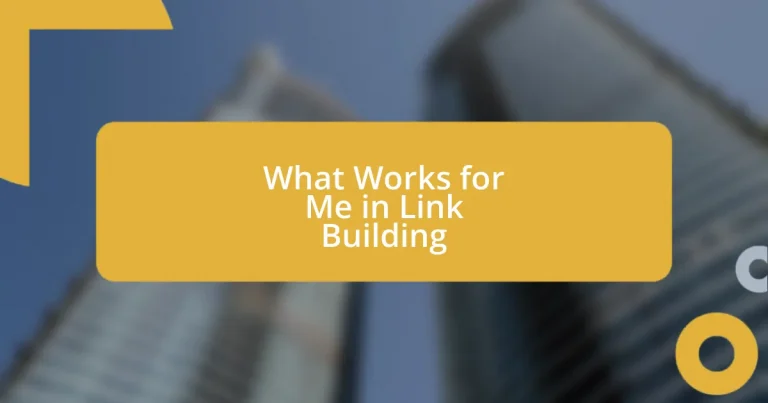Key takeaways:
- Link building is about creating valuable connections rather than just accumulating links; quality links from authoritative sites are more impactful than quantity.
- Personalized outreach and relationship building enhance link acquisition success; genuine connections can lead to collaboration and long-term benefits.
- Creating shareable content that resonates emotionally with the audience, combined with effective visuals, significantly boosts engagement and link potential.
- Monitoring the effectiveness of link building efforts through analytics is essential to understand which strategies work and to identify quality links.
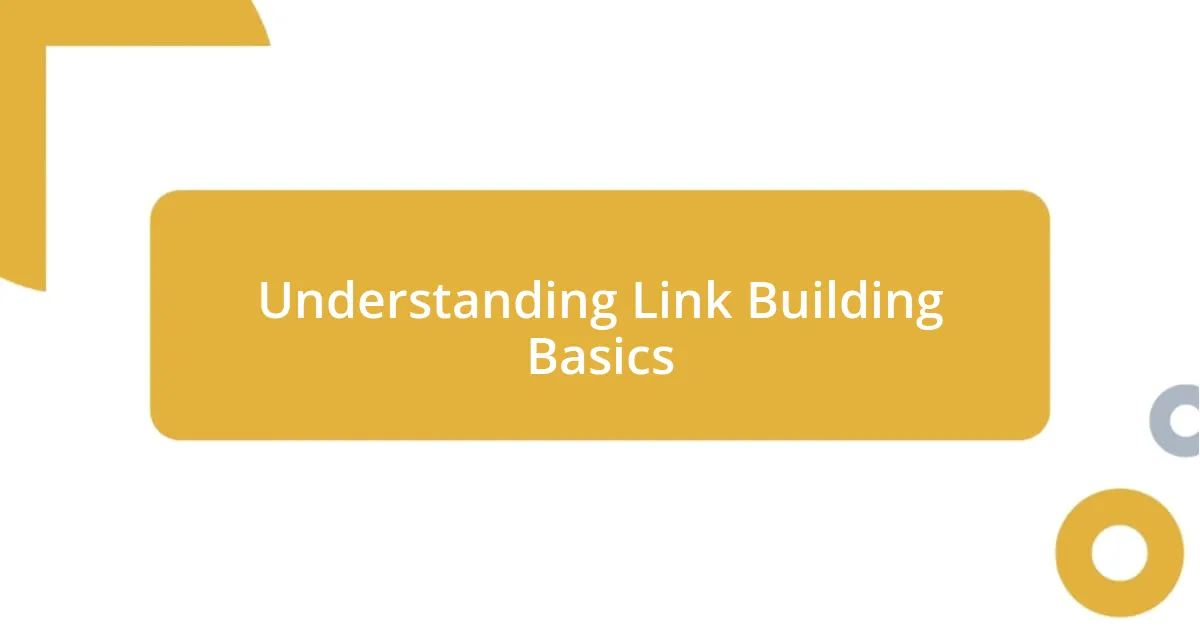
Understanding Link Building Basics
Link building is all about creating connections on the web. Each link to your site serves as a vote of confidence from other websites, which Google interprets as a signal that your content is credible and valuable. I remember the first time I landed a guest post on a reputable blog. The thrill I felt when I saw my link live was unreal—it was like getting a stamp of approval that boosted my confidence and my site’s search ranking.
Have you ever considered how much a single link can impact your website’s visibility? It’s fascinating to think about. A high-quality link can not only drive traffic but also elevate your site’s authority. In my experience, focusing on building relationships with influencers in your niche often leads to the most rewarding link outcomes. I’ve reached out with genuine compliments and offers to collaborate, leading to links that felt more like partnerships than mere transactions.
Understanding the difference between quality and quantity is pivotal in link building. I used to think I needed hundreds of links to make a difference. However, I soon found out that just a few authoritative links could skyrocket my results. It made me realize that it’s not about having the most links; it’s about having links that truly matter and come from trustworthy sources. So, when you’re building your strategy, ask yourself: Are these links contributing meaningfully to my site’s growth?
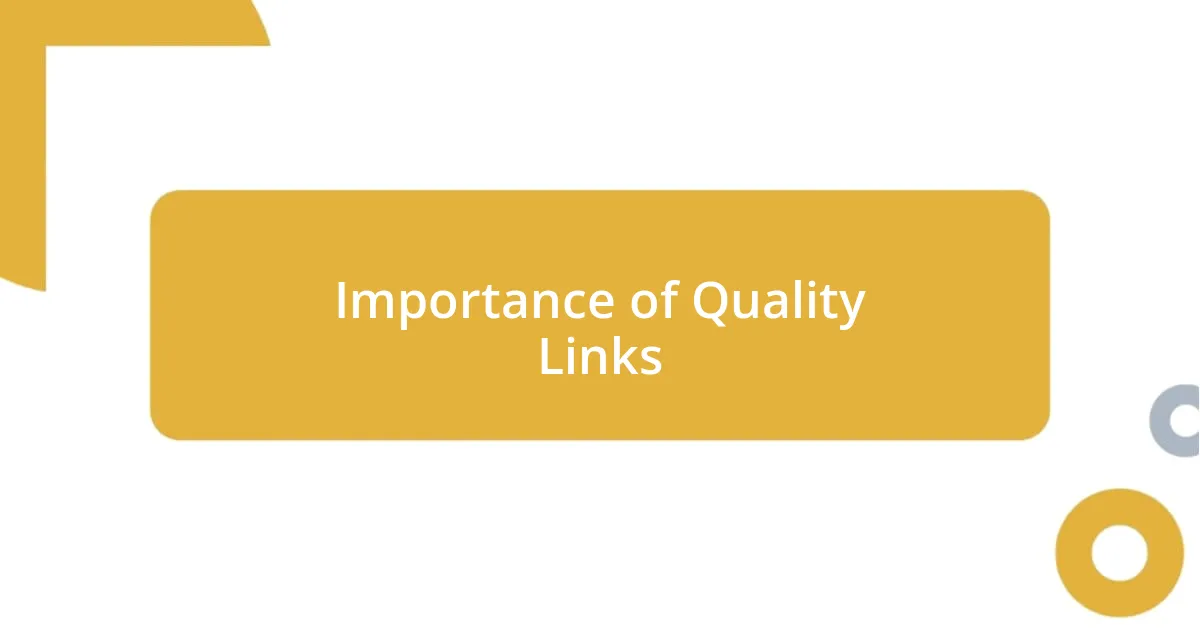
Importance of Quality Links
Quality links are essential because they signal to search engines that you’re a trusted source of information. I remember when one of my articles got linked by a well-known website in my industry; it felt like a badge of honor. That single link escalated my visibility and brought in a wave of new traffic. It was clear to me: the more reputable the site linking to you, the greater the endorsement it gives to your content.
In my opinion, the impact of quality links extends beyond just boosting your rankings. They can enhance your site’s credibility and help establish you as a thought leader in your niche. When I secured a link from an industry leader, I noticed an increase in inquiries about collaboration and speaking opportunities. This firsthand experience demonstrated that high-quality links can open doors I hadn’t even considered before.
I’ve learned that it’s not just about acquiring links; it’s about building relationships with those who provide them. Quality links often come from genuine connections. For instance, after I commented thoughtfully on a few blog posts and shared valuable insights, I was invited to contribute a guest post. That opportunity didn’t just provide a link; it helped forge a lasting professional relationship. So, consider how nurturing these connections can lead to impressive results for your link-building efforts.
| Quality Links | Low-Quality Links |
|---|---|
| Enhance credibility and authority | May lead to penalties and lower rankings |
| Drive targeted traffic | General, non-targeted traffic |
| Open opportunities for collaboration | Limited value and engagement |
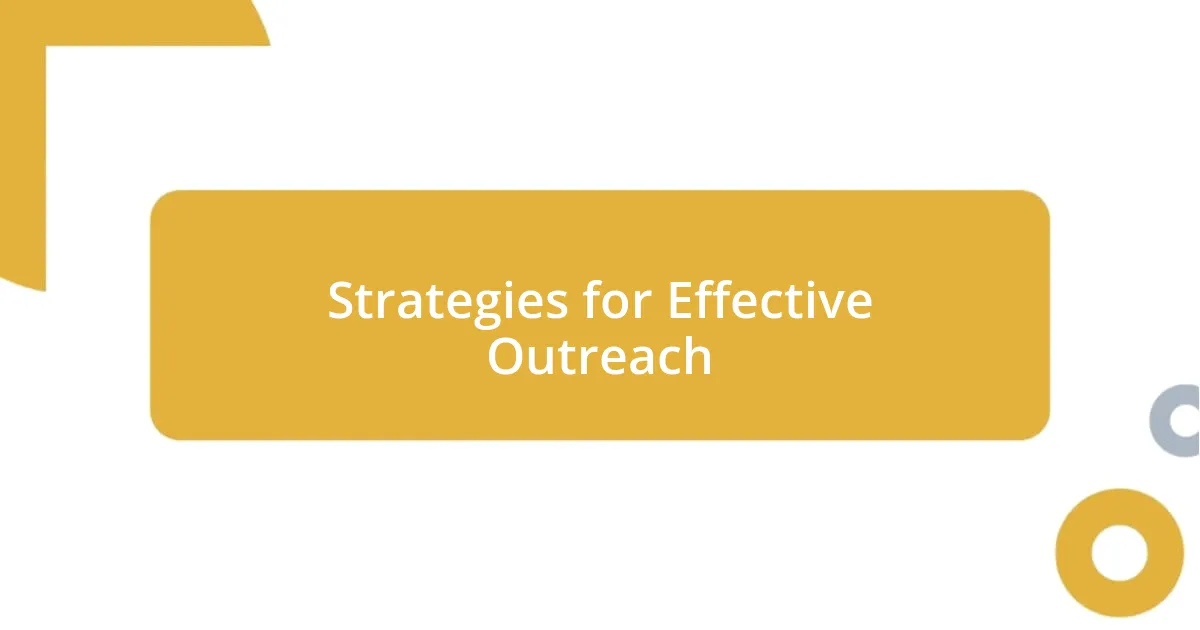
Strategies for Effective Outreach
When it comes to outreach, personalization is key. I once sent a generic email to a potential collaborator, and I honestly didn’t get a single reply. It was a big lesson for me. Now, I make it a point to research the person I’m reaching out to and mention specific things I appreciate about their work. That small touch usually translates into warmer responses and stronger connections.
Here are some effective strategies I’ve found particularly helpful for outreach:
– Craft personalized messages: Referencing their recent work shows you’ve done your homework.
– Be genuine: Share why you admire their content and how it resonates with your own.
– Offer value upfront: Whether it’s a guest post idea or sharing their content, make sure there’s something in it for them.
– Follow up respectfully: A gentle reminder can keep the conversation going without feeling pushy.
– Leverage social media: Engaging with them on platforms like Twitter or LinkedIn can break the ice before sending an email.
Another aspect I focus on is timing. I remember reaching out to a well-regarded blogger right before they launched a new project. My timing was off, and they let me know they were swamped. That experience taught me to consider not just who I’m reaching out to but also when I do it. Tracking industry events and news helps me identify the right moments to connect.
A quick checklist for timing your outreach effectively includes:
– Monitor their social media: See if they’ve mentioned any upcoming projects or busy periods.
– Plan around industry events: After conferences, people are often more open to conversations.
– Understand seasonal trends: Some niches have specific times of the year that are more active, and knowing that can help you strike while the iron is hot.
– Use tools for reminders: I rely on project management tools to stay organized and timely in my outreach efforts.
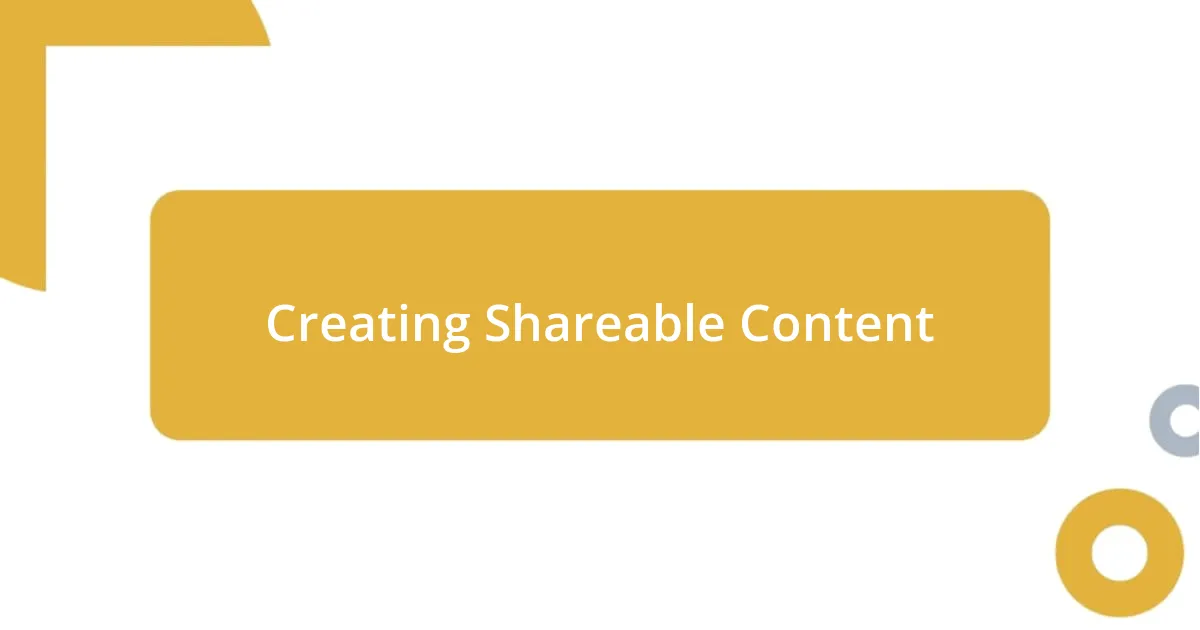
Creating Shareable Content
Creating shareable content is all about understanding what resonates with your audience. I can’t count the times I’ve created something I thought was amazing, only to find it fell flat. But one memorable experience taught me the importance of tapping into people’s emotions. I crafted a story around a challenge I overcame in my business, which struck a chord with many of my followers. The shares that followed were incredible. It’s amazing how vulnerability and authenticity can drive engagement.
Another key element I’ve discovered is the power of visuals. I remember posting an infographic that summarized complex information in a digestible format. The response was overwhelming! It not only attracted backlinks but also was shared widely across social media. Visuals can simplify intricate ideas, making them easier to share. So, why not pair your great content with captivating images, videos, or infographics? This combo can seriously enhance your content’s shareability.
Ultimately, I’ve learned that creating shareable content hinges on being relatable and engaging. Ask yourself, what emotions do I want my audience to feel? I’ve found that when I write with intention, it makes all the difference. For instance, a light-hearted piece I wrote about industry pet peeves generated tons of shares. It was fun, relatable, and sparked conversations. So, think about moments in your life or in your industry that could resonate. Those genuine insights are often what people want to share the most!
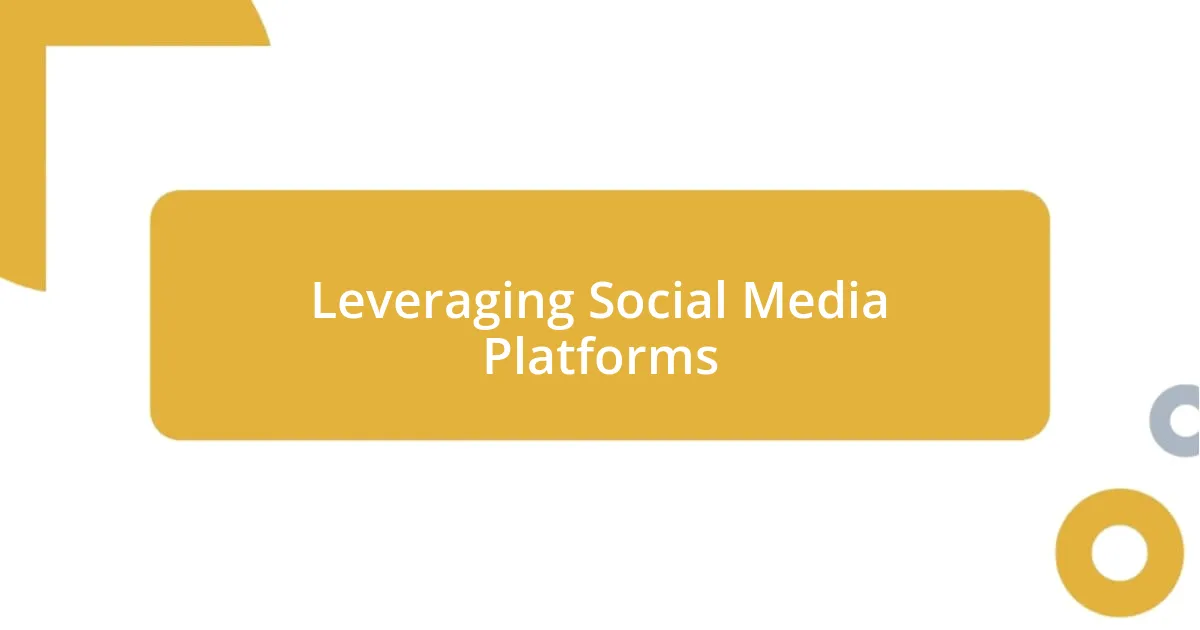
Leveraging Social Media Platforms
Leveraging social media can be a game changer for link building. I recall a time when I tweeted an article I loved, tagging the author, and they not only responded but shared my post with their audience. That single act opened the door for collaboration that I had never anticipated. Engaging actively on platforms like Twitter, LinkedIn, and even Instagram can foster genuine relationships that translate into links.
Another tactic I’ve employed is joining relevant groups or communities on these platforms. For instance, I once joined a Facebook group focused on digital marketing, and shared insights regularly. Eventually, others began to trust my expertise, and this led to opportunities to guest post or get featured on popular blogs. Have I found success through this approach? Absolutely! Being present and contributing value consistently in these spaces can naturally enhance your visibility and establish authority.
Don’t underestimate the power of cross-promotion. I remember partnering with a fellow content creator to hold a joint Instagram Live session. It was thrilling to merge our audiences! The engagement we received not only strengthened our networks but also encouraged backlinks from each other’s followers as they buzzed about our collaboration. By utilizing social media, I’ve seen that the more we connect and share our unique insights, the more opportunities we create for backlinks. So, what are you doing to tap into the potential of social media for your link-building efforts?
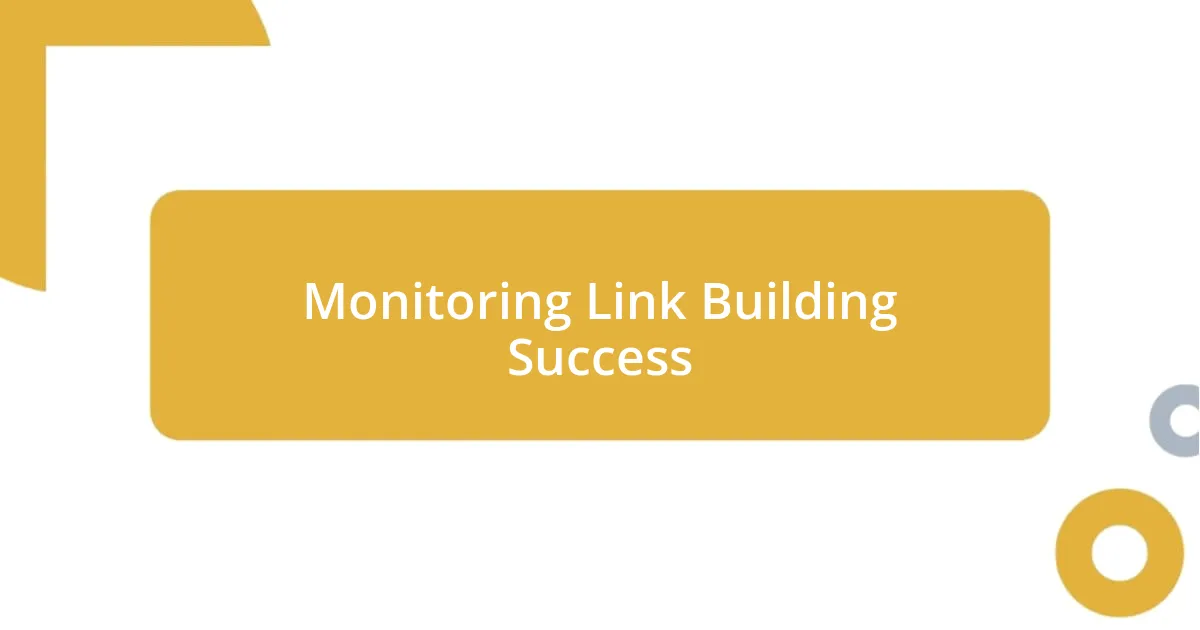
Monitoring Link Building Success
Monitoring the success of your link building efforts is crucial for understanding what’s actually working. I remember tracking my progress through various metrics like referral traffic and keyword rankings. Seeing a spike in traffic after securing a significant backlink felt exhilarating! It made me realize that every link can lead to tangible results, fueling my motivation to keep pushing forward.
I also find it helpful to use tools like Google Analytics and Ahrefs to gain deeper insights. For instance, after digging into Ahrefs, I discovered that one particular piece of content was gaining traction across more sites than I initially thought. It sparked some excitement! It’s like uncovering hidden treasures, and it can inform future content strategies effectively.
But I often ask myself, how do I know if a link is valuable? Not every backlink is created equal. I’ve learned that relevance and authority of the linking site matter immensely. I once celebrated a link from a site I thought was impressive, only to realize it had little sway in my niche. That experience taught me to be more discerning, reminding me that quality truly trumps quantity in the world of link building.
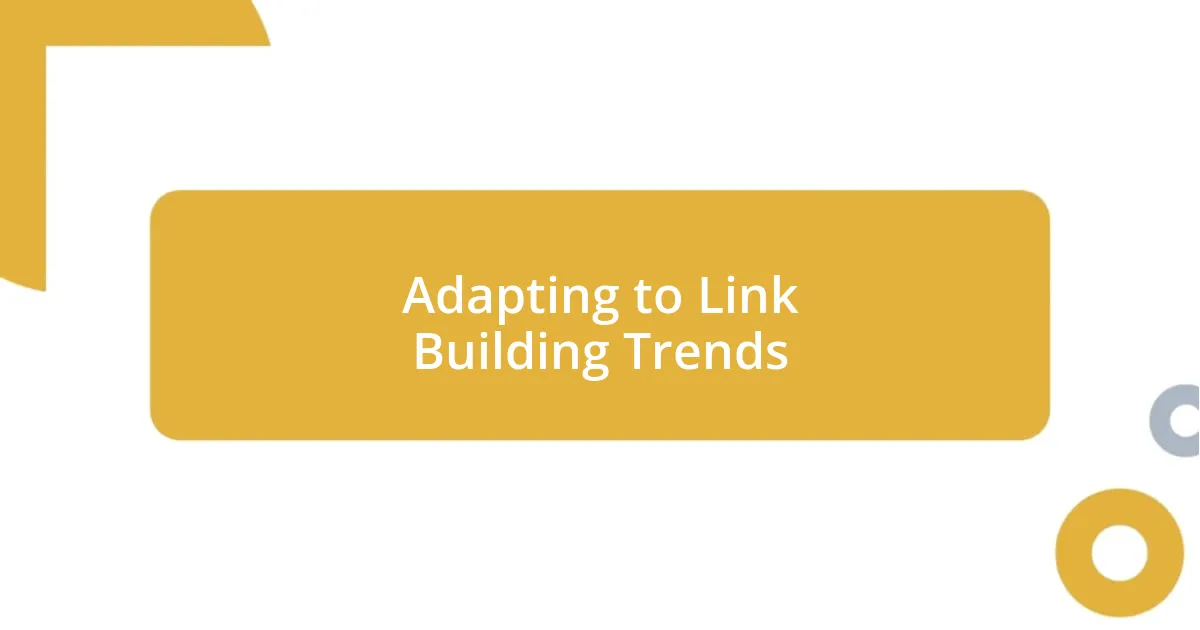
Adapting to Link Building Trends
Adapting to link building trends requires a keen eye on what’s changing in the digital landscape. I recall when the shift towards E-A-T (Expertise, Authoritativeness, Trustworthiness) became apparent. I found myself re-evaluating my content to ensure it resonated with Google’s expectations for quality. By prioritizing evidence-based information and backing my claims with reliable sources, I not only improved my rankings but also built stronger trust with my audience. Has this focus on quality opened more doors for me? Absolutely!
As search algorithms evolve, I’ve learned the importance of staying informed about new link building techniques. For instance, when I embraced the rise of video content, I also recognized how it could be a powerful tool for backlinks. I experimented by creating informative videos around my blog posts. The exposure they received on platforms like YouTube led viewers back to my content, generating valuable links and engaging a whole new audience. Isn’t it astonishing how trying something fresh can yield unexpected rewards?
Lastly, it’s essential to be flexible and willing to pivot. One memorable incident unfolded when my traditional outreach strategies weren’t yielding much success. Instead of sticking to a failing approach, I reached out to industry forums and niche websites. By sharing valuable insights and participating in discussions, I was able to forge connections organically. In that moment, I realized how crucial it is to adapt my strategy based on real-time feedback. Are you ready to change your approach when the situation calls for it? I certainly have and found it to be beneficial!
